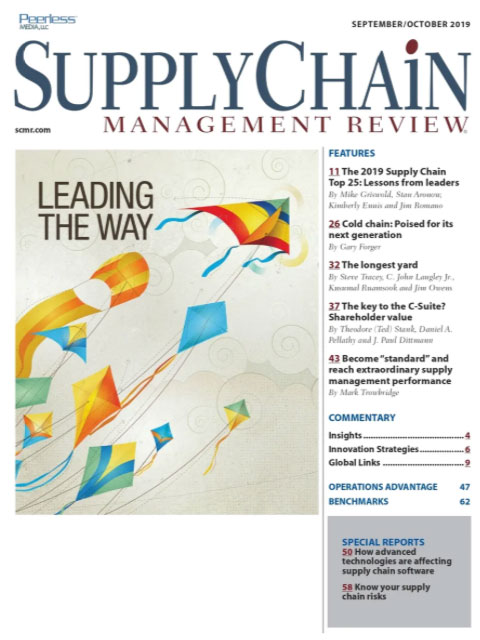Sorry, but your login has failed. Please recheck your login information and resubmit. If your subscription has expired, renew here.
September-October 2019
It’s that time of year again, when we feature the Top 25 supply chains from Gartner. What I enjoy most about this research is the window it provides into where supply chains are going next: After all, while some lead, the rest of us follow. Browse this issue archive.Need Help? Contact customer service 847-559-7581 More options
Two organizational challenges have consistently stymied the efforts of senior supply chain leaders to achieve their desired goals:
- the need for CEOs and CFOs to understand the strategic contribution of SCM; and
- the need for SCM to be elevated to a corporate-level strategic area of emphasis.
Focusing on supply chain decisions that affect shareholder value, the language spoken by the CEO and the board of directors, provides the key to unlocking that understanding and providing senior supply chain managers with a seat at the corporate strategy table.
What is shareholder value? It measures the long-term financial heath and long-range prospects for an organization and is reflected in the public share price of a firm’s stock or the private valuation of the organization. It also happens to be inextricably linked to supply chain performance.
Today, a small but growing number of companies have proven that supply chain performance can be used to drive shareholder value rather than serve only as a tool for reducing costs and improving product availability and service, as important as those goals may be. These firms recognize that supply chain improvements can be used to dramatically lower working capital and generate the cash flow to fund innovations in product and service offerings and ultimately to grow the business. Because these changes positively affect economic profit, investors reward these efforts with higher shareholder value. This type of performance, however, cannot be achieved without strong and consistent support from the CEO and the CFO due to the requirement to align across functions that are not typically within the purview of supply chain managers.

This complete article is available to subscribers only.
Log in now for full access or start your PLUS+ subscription for instant access.
SC
MR
Sorry, but your login has failed. Please recheck your login information and resubmit. If your subscription has expired, renew here.
September-October 2019
It’s that time of year again, when we feature the Top 25 supply chains from Gartner. What I enjoy most about this research is the window it provides into where supply chains are going next: After all, while some… Browse this issue archive. Access your online digital edition. Download a PDF file of the September-October 2019 issue.Two organizational challenges have consistently stymied the efforts of senior supply chain leaders to achieve their desired goals:
- the need for CEOs and CFOs to understand the strategic contribution of SCM; and
- the need for SCM to be elevated to a corporate-level strategic area of emphasis.
Focusing on supply chain decisions that affect shareholder value, the language spoken by the CEO and the board of directors, provides the key to unlocking that understanding and providing senior supply chain managers with a seat at the corporate strategy table.
What is shareholder value? It measures the long-term financial heath and long-range prospects for an organization and is reflected in the public share price of a firm's stock or the private valuation of the organization. It also happens to be inextricably linked to supply chain performance.
Today, a small but growing number of companies have proven that supply chain performance can be used to drive shareholder value rather than serve only as a tool for reducing costs and improving product availability and service, as important as those goals may be. These firms recognize that supply chain improvements can be used to dramatically lower working capital and generate the cash flow to fund innovations in product and service offerings and ultimately to grow the business. Because these changes positively affect economic profit, investors reward these efforts with higher shareholder value. This type of performance, however, cannot be achieved without strong and consistent support from the CEO and the CFO due to the requirement to align across functions that are not typically within the purview of supply chain managers.
SC
MR


Latest Supply Chain News
Latest Resources

 Explore
Explore
Business Management News
- Inflation continues to have a wide-ranging impact on supply chains
- Strategic cost savings differ from cutting costs
- Planning fatigue may be settling in
- Inflation, economic worries among top supply chain concerns for SMBs
- April Services PMI declines following 15 months of growth, reports ISM
- Attacking stubborn COGS inflation with Digital Design-and-Source-to-Value
- More Business Management
Latest Business Management Resources

Subscribe

Supply Chain Management Review delivers the best industry content.

Editors’ Picks






